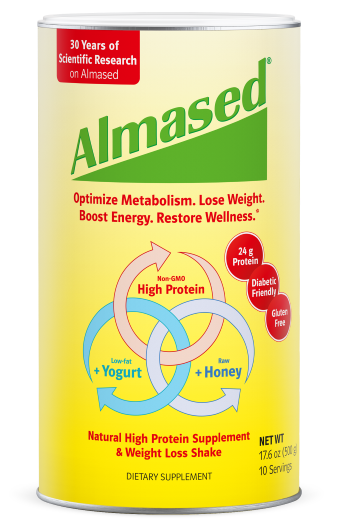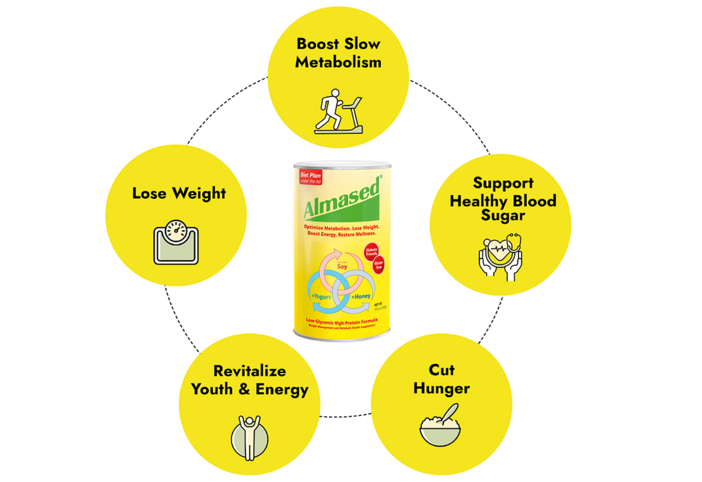What Is Almased And Does It Work

Imagine stepping into a cozy café, the aroma of freshly brewed coffee mingling with the gentle murmur of conversation. Sunlight streams through the window, illuminating a group of friends gathered around a table, their laughter echoing softly. They're discussing diets, a topic familiar to many, and one name keeps popping up: Almased. Is it just another fleeting trend, or does it hold genuine promise?
This article delves into the world of Almased, exploring its origins, ingredients, purported benefits, and the scientific evidence (or lack thereof) that supports its claims. We'll navigate the complexities of this popular dietary supplement, separating fact from fiction to help you make an informed decision about whether it's the right choice for your individual needs.
What Exactly is Almased?
Almased is a meal replacement powder marketed as a tool for weight loss, weight management, and overall wellness. It's primarily composed of soy, honey, and yogurt, and claims to work by boosting metabolism and preserving muscle mass during weight loss.
The company behind Almased emphasizes the importance of maintaining a healthy metabolism for effective weight management. They suggest that their product achieves this through its specific combination of ingredients.
The Origins and Philosophy
Almased's story began over 30 years ago in Germany, with Hubertus Trouillé, a holistic therapist. Trouillé sought a natural solution to improve the metabolism of his patients and found it in the formulation that became Almased.
The core philosophy behind Almased revolves around optimizing the body's natural ability to burn fat and build muscle. The company claims the product supports this process by providing a balanced blend of amino acids and nutrients.
The Key Ingredients
The Almased formula hinges on the interaction of its three core components: soy protein, honey, and yogurt. Each ingredient contributes specific nutritional aspects to the powder.
Soy protein is the primary protein source, known for its complete amino acid profile. It's considered important for muscle preservation during calorie restriction.
The honey used in Almased undergoes a special fermentation process. This process breaks down the sugars, creating a product that the company claims is lower on the glycemic index and provides beneficial enzymes.
Yogurt adds to the protein content and contributes probiotics, which are beneficial bacteria for gut health. The probiotics are added after fermentation to make it stable.
How Almased is Marketed
Almased is typically marketed as part of a structured diet plan. This usually involves replacing one to three meals per day with Almased shakes, combined with healthy snacks and a balanced diet.
The Almased diet is often promoted as having different phases, starting with a strict meal replacement phase for rapid weight loss, followed by a stabilization phase and then a maintenance phase. The official website offers recipes and guidance for each stage.
The company also highlights the potential for improved energy levels and overall well-being alongside weight loss.
Does Almased Really Work? Examining the Evidence
The question of whether Almased *actually works* is a complex one. While anecdotal evidence abounds, it's essential to examine the scientific research.
Some studies suggest that high-protein diets, like the one encouraged when using Almased, can be effective for weight loss and preserving muscle mass. However, many of these studies investigate general high-protein diets rather than Almased specifically.
Several studies funded by the company indicated favorable outcomes in groups using Almased. However, independent research on the effects of Almased is limited, and more extensive, unbiased studies are needed to confirm these claims.
Potential Benefits and Considerations
Beyond weight loss, some users of Almased report benefits such as improved energy levels and better blood sugar control. These benefits are sometimes linked to the improved nutritional intake and the absence of processed foods.
It's also worth noting that Almased contains soy, which may be a concern for individuals with soy allergies or sensitivities. Additionally, the honey content, while fermented, might not be suitable for individuals with strict dietary restrictions related to sugar intake.
Before starting any new diet or supplement regimen, it's vital to consult with a healthcare professional, especially if you have pre-existing medical conditions or are taking medications. They can assess whether Almased is appropriate for your individual needs.
Looking Beyond the Hype
While Almased has gained popularity as a weight loss aid, it's crucial to remember that it's not a magic bullet. Lasting weight loss is almost always the result of sustainable lifestyle changes. These include a balanced diet, regular exercise, and consistent self-care.
It's important to be wary of any product that promises effortless or rapid weight loss. Long-term health and well-being stem from making gradual, sustainable adjustments to one's lifestyle rather than relying on quick fixes.
Conclusion: A Holistic View
Almased presents itself as a potential tool for weight management, combining soy protein, honey, and yogurt into a meal replacement powder. While some studies and anecdotal evidence suggest it can be effective, it's not a substitute for a balanced diet and regular exercise.
As with any dietary supplement, it's vital to approach Almased with a critical eye, consult with a healthcare professional, and consider it as a potential part of a broader healthy lifestyle plan. Remember, the journey to well-being is a marathon, not a sprint.
Ultimately, the decision of whether or not to use Almased rests on your individual circumstances and preferences. Informed choices, guided by both scientific evidence and personal needs, are the key to a healthier and happier you.


















